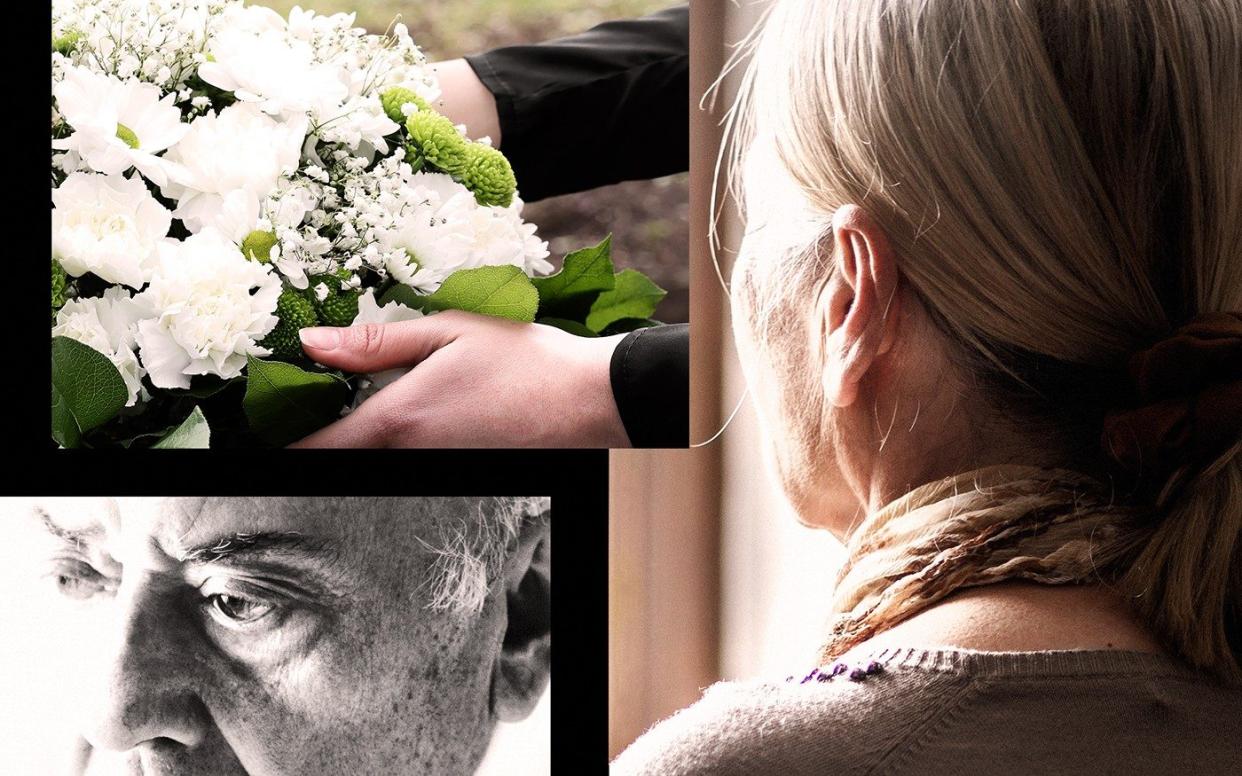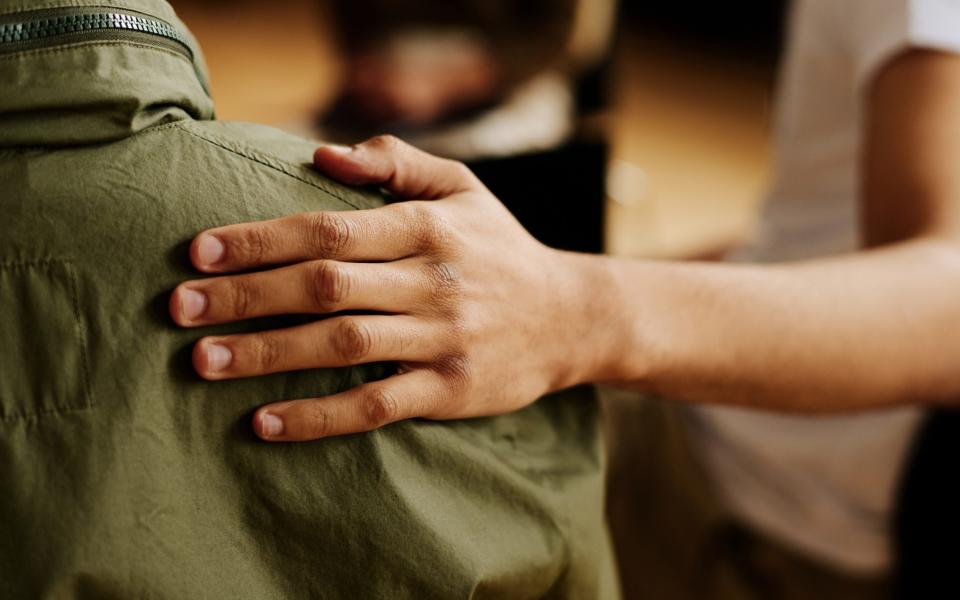What to say – and not say – to a friend who’s bereaved

How do we support the ones we love when they have lost the ones they love? Not very well, says the UK Commission on Bereavement, which published a recent report. One of the largest ever consultations on bereavement support undertaken in the UK, which included over 1,000 adult and 100 child respondents found that a shocking near 50 per cent of respondents stated they received no help from friends when a loved one died.
“This lack of support really reflects a massive ongoing taboo we have in society about talking about death and about grief,” says Rachel Warren, senior policy and research manager for Carers, Relationships and Bereavement at Marie Curie, a charity which cares for people with all terminal illnesses and provides a nationwide free listening service for people grieving the loss of loved ones.
“We found that very sadly, many people who are bereaved feel that their friends and their colleagues and their family avoid them or ignore them after a death because they feel so uncomfortable and they don’t know what to say.”

Kris Carr is the author of I’m Not A Mourning Person: Braving Loss, Grief And The Big Messy Emotions That Happen When Life Falls Apart (Hay House, £16.99). She believes that the majority of people are what she calls “grief illiterate”.
“This doesn’t mean people are jerks (although it may feel like that in the moment), it just means that they’re inexperienced in handling the big emotions that accompany life’s scary moments,” she says.
So how do we become more comfortable talking about death, dying and grief and how do we support our friends when they have lost their spouse or partner? “There are no magic words that can take away the pain from those who are grieving,” she says. “And it’s not our job to do so. It’s not your job to make it better. It’s your job to hold space for whatever feelings need to be expressed, and above all, be loving,” says Karr.
“I think many people are scared they will make things worse by saying the wrong thing. But the worst thing you can do is to ignore or avoid the bereaved. Grief can make you feel very isolated and what you need is people to support you in your hour of need. Do not ignore or avoid a grieving friend because you feel uncomfortable,” says Warren.
What to say when a friend’s partner has died
Acknowledge what has happened, says Karr. “Address the elephant in the room, be willing to talk about what happened. Can this be uncomfortable? Yes. But do it anyway.”
She suggests using phrases such as: “I’m sorry you’re going through this” “I’m not sure what to say but I’m here to listen”. “I don’t know how you feel but I’m here to help in any way I can”. “I’ll bet you can use some help right now. How about I…. run errands, get you groceries, walk the dog?”
Phrases to avoid: “He’s in a better place now”…“It’s God’s plan”… “Aren’t you over it yet?… It’s been months, years decades”… “At least she lived a long life”…“There’s a reason for everything”.
Create ‘safe places’ to talk
“Inviting your friend to go for a walk can be a really good way to create a space for your friend to easily talk about how they feel,” says Warren. “Everyone grieves differently. Some people may want to talk about their lost loved one, others may want to distract themselves by talking about other things but the goal here is to be a supportive presence, so your friend does not feel alone.” Ask open questions: How are you? How are you feeling? “If your friends get upset, allow them to cry and just be there. Studies show that tears are the body’s release valve, and it can help them feel better,” says Warren.
Be a loving force in their lives
“Hug them, hold their hand, tell them you love them, validate their feelings, especially the raw, embarrassing ones,” says Karr. She suggests you invite them to talk about their partner and ask them to share good memories.
Always check before giving unsolicited advice
“Ask, ‘Do you want advice right now, or do you want to brainstorm, or do you just want to get it off your chest?’ Asking permission never hurts,” says Karr. “Try to gently put attention on the other person, don’t talk about your own losses or compare or explain what it was like for you when your mum/dad/brother died. That can invalidate your friend’s experience. Listen more than talk,” says Warren.
If the person has died suddenly, be extra vigilant
“Sometimes when it’s a sudden death and people can be at a higher risk of suicide because it’s so shocking and it feels so unreal that your friend or relative wants to be with the person who died, “ says Sharon Jenkins, who is a bereavement counsellor for Marie Curie in Cardiff. “We know that people who experience sudden loss and are more at risk of what’s called ‘complicated grief’, which is where they may kind of suffer prolonged feelings of distress and difficulty continuing with their lives and mental health complications.”
“Often when people find themselves suddenly bereaved, they are in shock and may not be looking after themselves – not eating, sleeping or showering,” says Jenkins. “Make appointments to call at meal times and take lunch. Say, ‘I brought lunch for us. You don’t have to go out. You don’t have to face the world, but I’ve brought lunch.’”
Find specific peer support groups for your friend
“You can have sympathy for your friend, but it can be extremely helpful to find peer support groups who may have gone through what your friend has specifically gone through. For example, a young widowhood support group or a support group for grieving carers or a support group for those bereaved by suicide,” says Warren. Do the research and find them appropriate groups to reach out to and give them all the details.
Send them to the Men’s Shed
Studies show that men may struggle harder than women to establish and keep social ties once they’ve lost their partner. “Older men are less likely to have established social networks to lean on, and they are also less likely to confide in one another about personal or health issues,” says Warren. “The Men’s Shed is an informal men’s group – which invites bereaved men to take part in activities such as woodworking, carpentry, even car building.”
Offer support for the practical and administrative burden
“Even if someone has been ill for a long time, there is still enormous amounts of admin to do in a short period of time – everything from registering the death to organising the funeral to informing government and private companies,” says Warren.
“Also, if your friend’s spouse has died at home, they’re very likely to have a large amount of medical equipment which will all need to be returned. That’s a huge amount for a single person to do at a time when they’re extremely emotionally vulnerable.” Offering practical support or just being by their side while they deal with all that needs to be done can help, she says.
Marie Curie is one of four charities supported by this year’s Telegraph Christmas Charity Appeal. The others are Go Beyond, Race Against Dementia and the RAF Benevolent Fund. To make a donation, please visit telegraph.co.uk/2023appeal or call 0151 284 1927
